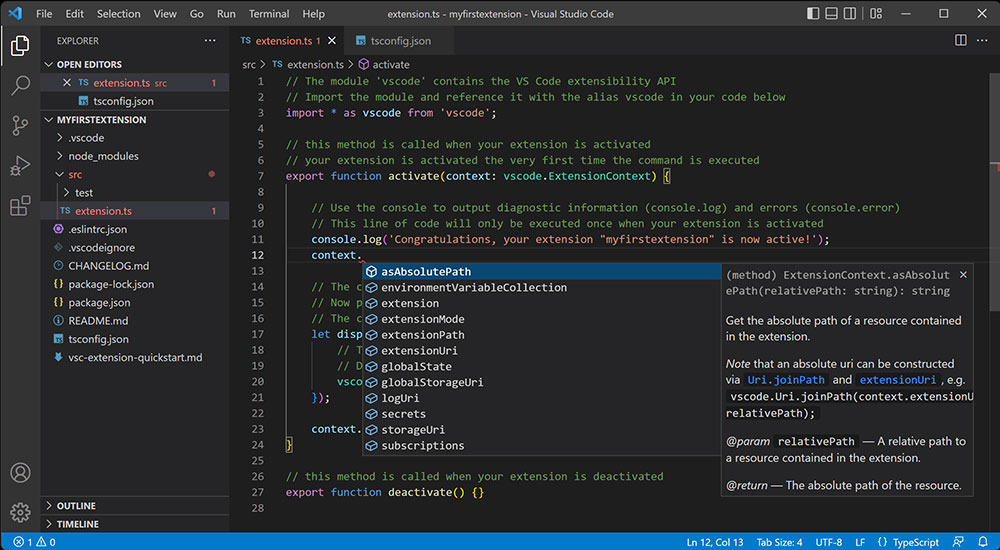Picture this: you’re piecing together a digital jigsaw. Each line of code is a fragment bringing life to a vivid picture on the web. Now imagine you’ve got more than just the familiar JavaScript-shaped pieces; there’s a whole array of shapes and colors waiting to enrich your palette—welcome to the world of JavaScript alternatives.
Here’s the deal. We all love JavaScript, right? It’s like the bread and butter of web development.
But sometimes, you crave a little variety or a different flavor to suit your project’s unique taste. That’s where the quest for alternatives kicks in, from structured TypeScript elegance to Dart language’s fluidity—and plenty more.
By the end of this deep dive, you’re going to be clued-in on other tools in the coding toolkit.
We’ll explore how the likes of WebAssembly and Elm programming are making waves in crafting interactive web experiences. Plus, you’ll get the lowdown on how frameworks like Vue.js and Angular are cozying up with new companions to revolutionize your digital canvas.
Hang tight, as we’re about to unravel the sometimes overlooked, yet equally fascinating world of refining the web developer’s art—without our usual JavaScript sidekick.
JavaScript alternatives
| JavaScript Alternative | Primary Language | Compiles to | Main Use-case | Ecosystem/Interoperability |
|---|---|---|---|---|
| TypeScript | Superset of JavaScript | JavaScript | Type-safe JS development | Large, fully compatible with JS |
| CoffeeScript | Custom syntax inspired by Ruby | JavaScript | more readable, succinct code | Declining, mostly compatible |
| Dart | Standalone language | JavaScript or native binaries | Web and mobile (Flutter) | Moderate, allows direct JS interop |
| Elm | Functional language | JavaScript | Frontend, with no runtime exceptions | Small, not directly JS compatible |
| ClojureScript | Lisp dialect | JavaScript | Functional programming | Moderate, Leiningen & shadow-cljs |
| PureScript | Functional language inspired by Haskell | JavaScript | Functional web apps | Moderate, Spago package manager |
| Scala.js | Scala language | JavaScript | Web front-end to Scala backend | Moderate, can use NPM packages |
| Kotlin/JS | Kotlin language | JavaScript | Kotlin multiplatform projects | Moderate, seamless interop with JS |
| ReasonML | OCaml variant | JavaScript | Type-safe, functional web apps | Moderate, compatible with NPM modules |
| Fable | F# language | JavaScript | Safe, functional .NET on the web | Moderate, integrates with JS ecosystem |
| Crystal | Ruby-like language | Not directly to JS (native) | General programming | Small, not a direct JS alternative |
| Opal | Ruby to JavaScript | JavaScript | Writing web applications in Ruby | Moderate, compatible with Ruby gems |
| Emscripten | C/C++ | JavaScript (asm.js/webassembly) | Performance-intensive applications | Large, can compile most C/C++ |
| Brython | Python | JavaScript | Python in browser | Moderate, full Python syntax |
| Haxe | Haxe language | JavaScript (among others) | Cross-platform development | Large, rich standard library |
| Nim | Nim language | JavaScript or native binaries | Efficient, expressive syntax | Moderate, with Nimble package manager |
| GopherJS | Go language | JavaScript | Writing front-end code in Go | Small, compatible with Go ecosystem |
| Cheerp | C/C++ | JavaScript/WebAssembly | Optimized web applications | Moderate, Cheerp-specific libraries |
| Blazor WebAssembly | C# and Razor | WebAssembly | .NET in the browser | Growing, part of .NET ecosystem |
TypeScript
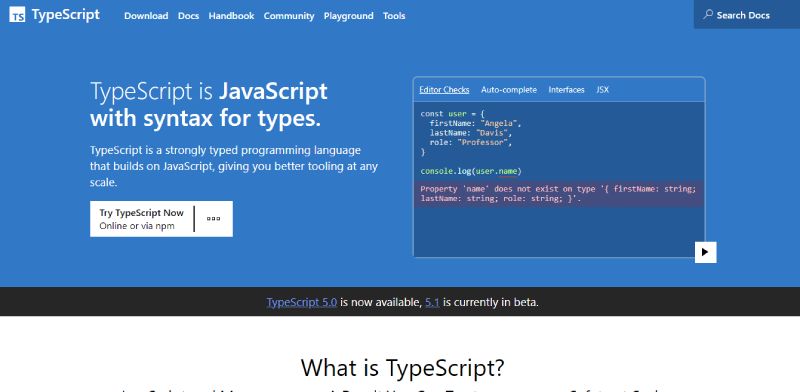
Imagine JavaScript got a promotion; that’s TypeScript. It feels like your comfortable JavaScript sneakers but with a shiny, new, type-safe upgrade. TypeScript’s about catching mistakes before they happen and helping you keep your code clean—like a spellchecker for your programming.
Best Features:
- Type safety
- Strong tooling support
- Backward compatible with JavaScript
What we like about it: TypeScript’s love letter is its ability to streamline the development process with its strong type system, making it a darling for those managing larger-scale applications.
CoffeeScript
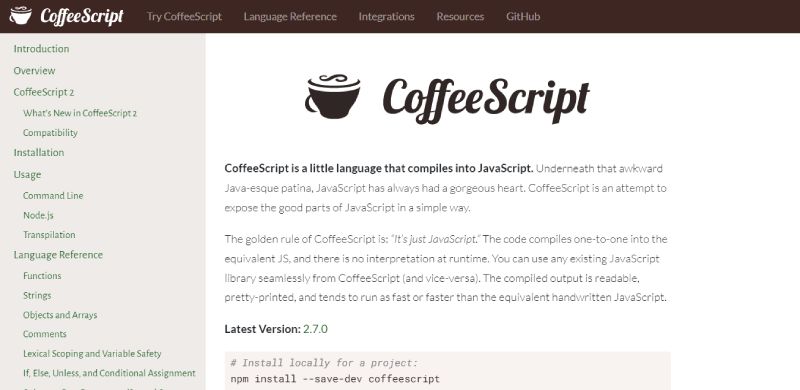
CoffeeScript is like that minimalist artist who strips away the unnecessary to reveal pure beauty. With a syntax that’s more succinct than traditional JavaScript, it invites you to write clear and readable code that compiles down to the JavaScript basics. It’s poetry in motion for coders.
Best Features:
- Clean, readable syntax
- Less boilerplate code
- Smooth integration with JavaScript
What we like about it: CoffeeScript de-clutters the coding landscape, which makes it ideal for developers looking to write JavaScript without the noise. Its elegant syntax is what wins hearts.
Dart

Enter Dart: Google’s answer to a scalable web. It’s ambitious—designed for building complex, high-performance apps for the modern web. Think JavaScript, but supercharged and with a penchant for structured code. Perfect for folks ready to dive deep into app development.
Best Features:
- Optimized for UI development
- Strong library ecosystem
- Great for building complex applications
What we like about it: Dart feels at home with both web and mobile frameworks, notably Flutter, making it a go-to for seamless app experiences across devices.
Elm
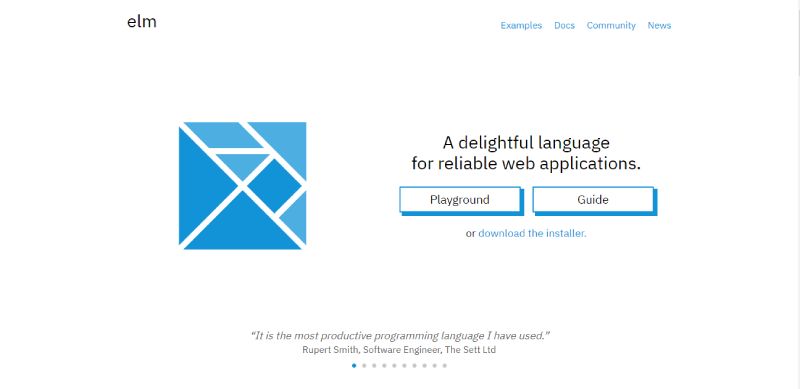
Elm is the brainy, eccentric type that guarantees no runtime errors in its ecosystem. It’s a functional programming language born for making web development more reliable and pleasant. Elm’s strong suit is simplifying your coding life, particularly when you’re playing around with user interfaces.
Best Features:
- No runtime errors
- Friendly error messages
- Strong architecture patterns
What we like about it: Elm stresses less debugging and more creating with its promise of a no-runtime-error experience, taking the cake for developers seeking peace of mind.
ClojureScript
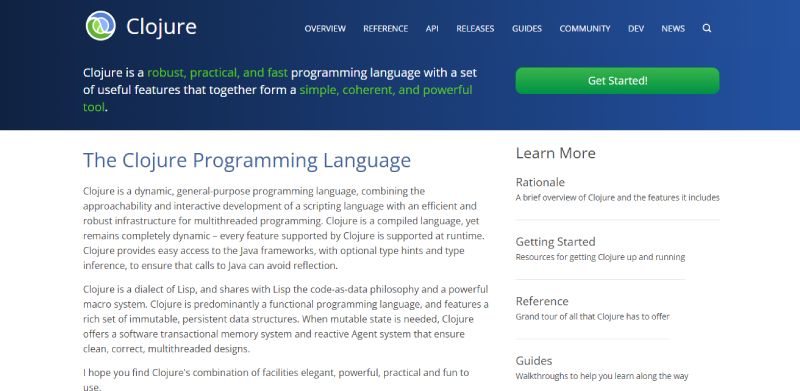
ClojureScript comes with all the power of Clojure, yet it’s tailored for the web. Built atop the robust Java platform, it leverages functional programming to make your web apps resilient and quick-witted. For the code connoisseur who appreciates brevity and immutability.
Best Features:
- Functional programming paradigm
- Immutability by default
- Interoperable with JavaScript and Java
What we like about it: The harmonious marriage between functional programming and the omnipresent JavaScript ecosystem makes ClojureScript a secret weapon for sophisticated web development.
PureScript
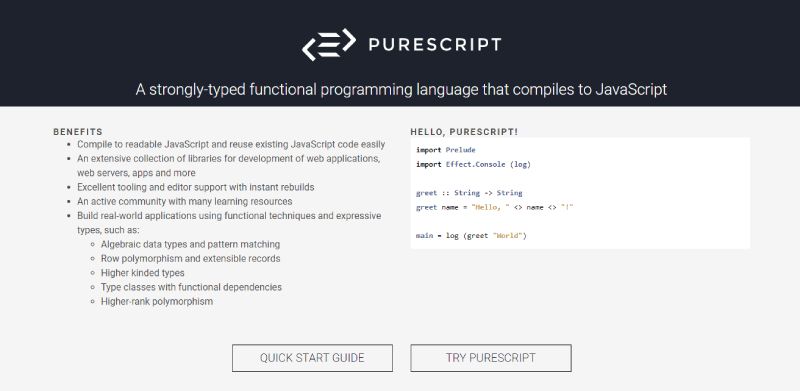
Think of PureScript as the philosopher of programming languages—deep, meaningful, and pure. A strongly-typed language that compiles to JavaScript, enabling elegant and robust web applications. It’s for those who demand precision and have a soft spot for functional programming goodness.
Best Features:
- Strongly-typed functional language
- Extensive type safety
- Generates readable JavaScript output
What we like about it: PureScript’s fanfare is all about bridging the gap between mathematics-like precision and practical web applications. It’s the type system that garners applause.
Scala.js
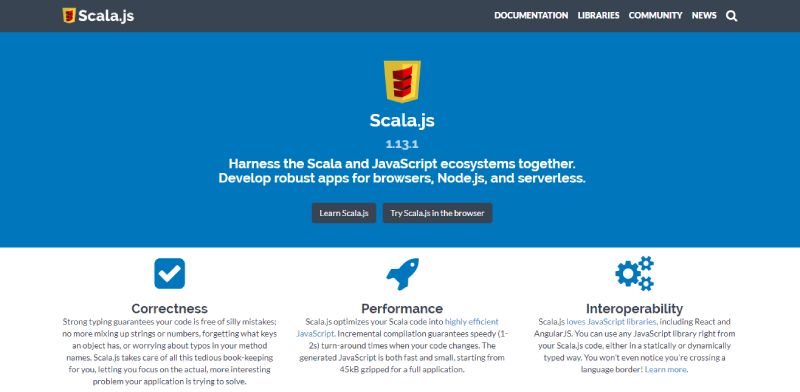
Scala.js brings Scala’s muscular backend prowess to the frontend playground. It’s all about marrying functional and object-oriented programming for web developers seeking that extra bit of sophistication and power. Interop with JavaScript libraries? Check. Scala.js is versatility in a nutshell.
Best Features:
- Full interoperability with JavaScript
- Advanced language features of Scala
- Robust tooling ecosystem
What we like about it: Scala fans also rave about the consistent developer experience it provides, whether you’re working on server-side or browser code. It’s the rhythm that keeps the code flowing smoothly from backend to frontend.
Kotlin/JS
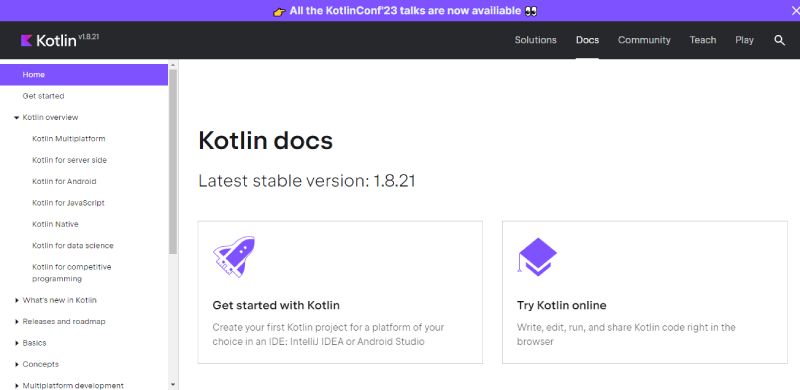
Kotlin/JS whispers sweet nothings to both JavaScript and Java developers. Born from the fertile lands of JetBrains, it’s pragmatic, it’s modern, and it serves up the beauty of Kotlin for web development. As interoperable with JavaScript as a chameleon is with its colors, Kotlin/JS is a charm.
Best Features:
- Null safety
- Concise syntax
- Interoperability with JavaScript
What we like about it: Kotlin/JS is adored for easing the Java to web transition with its comfortable syntax while sprinkling in some null safety for tranquility.
ReasonML
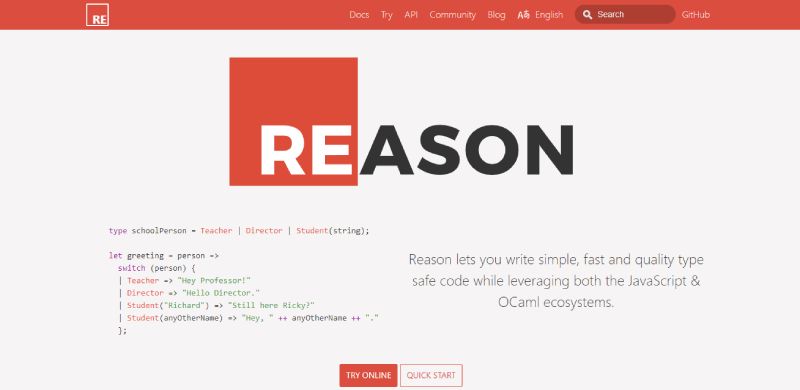
In steps ReasonML—JavaScript’s cooler, reasoned cousin, with a type system that’s tighter than a drum. It appeals to the React developers craving some OCaml-inspired type safety and functional features, making ReasonML a go-to for intricate and reliable web apps.
Best Features:
- Strong type system
- Interoperability with JavaScript and OCaml
- Functional programming constructs
What we like about it: What wins developers over is ReasonML’s blend of functional programming with JavaScript’s flexibility—giving birth to an efficient and predictable coding experience.
Fable
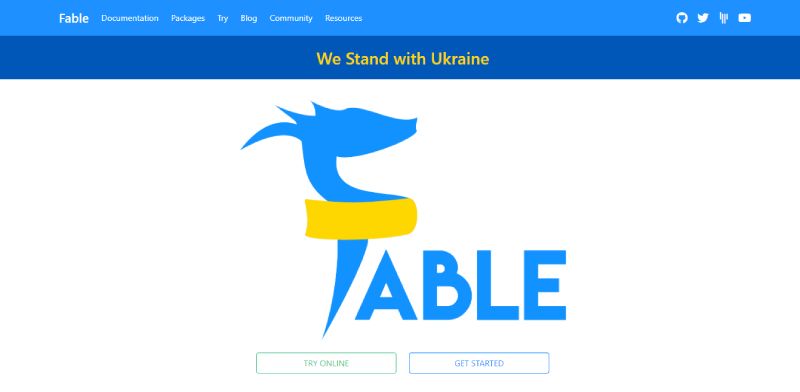
Fable is not just another transpiler; it’s a fairytale bridge between F# and JavaScript, weaving functional programming into the rich fabric of the JavaScript ecosystem. Ideal for those seeking a mix of .NET sturdiness and JavaScript’s ubiquity.
Best Features:
- F# functional goodness
- Strong community support
- Easy integration with JavaScript libraries
What we like about it: Devs crush on Fable’s magical ability to transform F#’s elegance into JavaScript operable gold. It’s about adding a dash of functional chic to your web apps.
Crystal

Crystal dazzles with the promise of C-like performance with Ruby-like syntax—sleek, fast, and downright attractive. It targets those yearning for high-speed execution without sacrificing beauty and simplicity in their web development journey.
Best Features:
- High performance
- Ruby-inspired syntax
- Static typing with type inference
What we like about it: The speed is what gets people talking—a veritable hare in the race, without compromising on the readability and elegance coders have come to love.
Opal
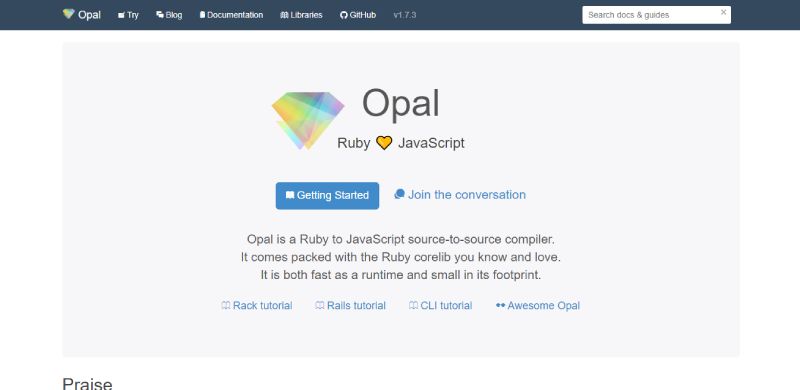
Opal shines by letting Rubyists stay in their comfort zone while still playing in the JavaScript sandbox. It’s a source-to-source compiler that translates Ruby code into JavaScript, sprinkling some Ruby magic onto your web pages.
Best Features:
- Ruby’s expressive syntax
- Staying within the Ruby ecosystem
- Source maps for debugging
What we like about it: Ruby enthusiasts find solace in Opal’s unique ability to bring Ruby’s expressive elegance to the realm of client-side scripting.
Emscripten
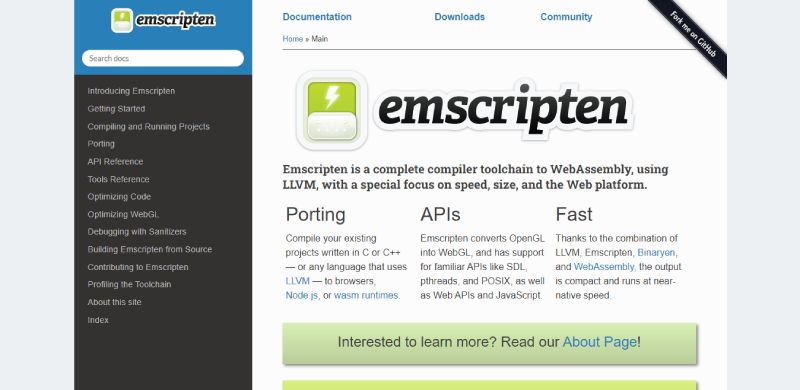
Emscripten is like a teleportation device for C and C++ into the browser universe. This LLVM-to-JavaScript compiler allows heavyweight languages to run as web-optimized code. Perfect for preserving legacy code and boosting performance-hungry applications.
Best Features:
- Porting C/C++ to the web
- High-performance web applications
- Utilizing established codebases
What we like about it: Hardcore developers respect Emscripten for breathing new life into mammoth C/C++ applications, ushering them seamlessly into the web dimension.
Brython
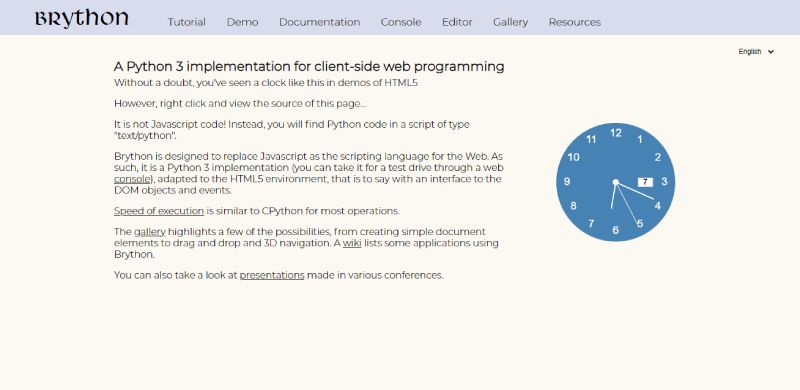
Brython buzzes with Python’s power in the web ecosystem. It’s Python flying straight into your browser, breaking down the barriers for Python aficionados to script their way to dynamic web content.
Best Features:
- Python syntax for client-side scripting
- Strong standard library
- Seamless integration with existing web technologies
What we like about it: Pythonistas love Brython for making their favorite language a first-class citizen in browser land—without a server in sight.
Haxe
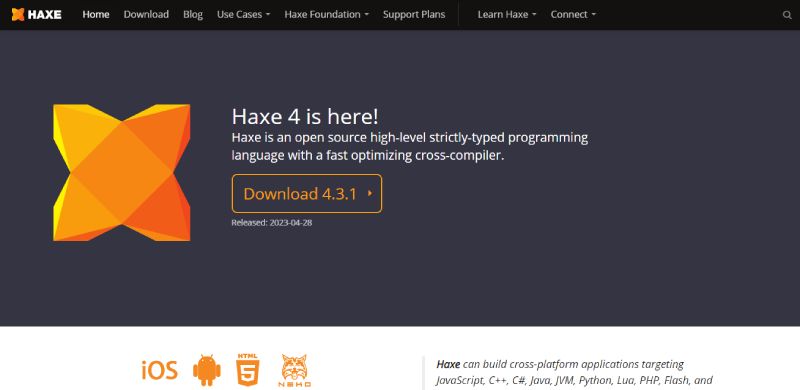
Haxe is the multilingual savant—it jumps between platforms and languages with athletic grace. High on adaptability, Haxe writes once, then deploys everywhere, resonating with developers aiming for the widest reach with minimal fuss.
Best Features:
- Cross-platform codebase
- Consistency across targets
- A vibrant community and ecosystem
What we like about it: It’s Haxe’s “code once, deploy anywhere” mantra that fans chant. It’s the Swiss Army Knife in your development belt.
Nim
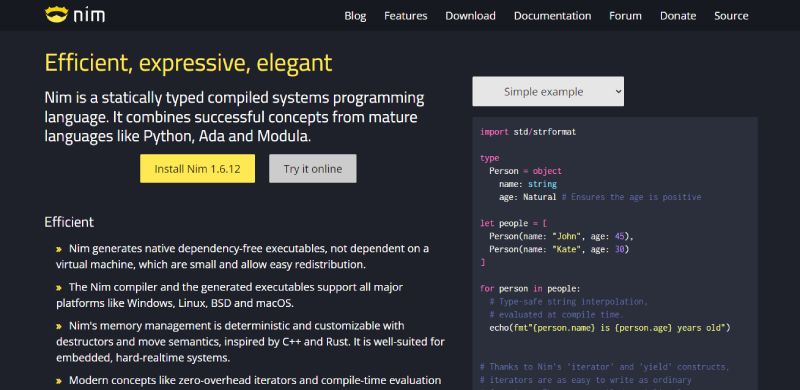
Nim prances onto the scene with Python-inspired syntax and C-speed performance. This statically-typed compiled language is designed for efficiency, expressiveness, and elegance, ticking all boxes for developers in pursuit of balanced web craftsmanship.
Best Features:
- Python-like syntax
- Compile-time meta-programming
- Efficiency and performance
What we like about it: Enthusiasts champion Nim for striking that rare balance: it’s like getting your cake, eating it, and finding out it’s good for you—speedy and sophisticated.
GopherJS
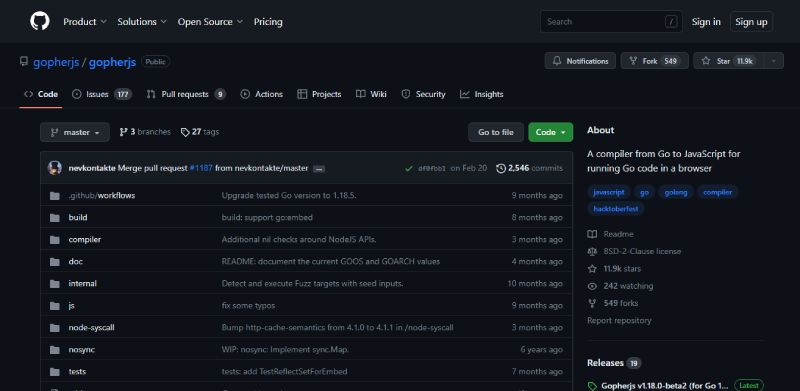
With GopherJS, Go developers can spiel their backend dialect straight into the web’s forefront. It’s like Go’s passport to the web, offering Gophers the ability to extend their reach into the browser without bending backwards learning a new language.
Best Features:
- Familiar syntax for Go developers
- Comprehensive Go runtime implementation
- Robust interoperability with JavaScript
What we like about it: GopherJS earns kudos for giving Go the freedom to roam into web territory, making it a refreshing breeze for backend devs.
Cheerp

Cheerp teeters on the cutting-edge—it’s the tool that compiles C++ into JavaScript and WebAssembly, putting the high-octane fuel of C++ into your web engine. For those on a quest for speed and legacy, Cheerp’s their trusty steed.
Best Features:
- Dual compilation to JavaScript and WebAssembly
- Compatibility with existing C++ code
- Optimization for web performance
What we like about it: Cheerp lures in C++ aficionados with its dual-output compiling prowess, ensuring their code flies at web speed without a hitch.
Blazor WebAssembly

Blazor WebAssembly is like giving web developers the butter without the churn—bring your .NET skills to the web-world, hassle-free. Craft interactive UIs with C#, revel in the runtime performance, all while kissing complex JavaScript frameworks goodbye.
Best Features:
- .NET in the browser
- Modern, interactive web apps
- Reduced reliance on JavaScript
What we like about it: .NET developers swoon over Blazor’s promise, letting them lean on familiar C# for building rich web applications fast—no need to juggle multiple languages.
FAQ on JavaScript alternatives
Why Look Beyond JavaScript for Web Development?
Here’s the scoop. It’s not always about jumping ship from JavaScript. Often, it’s about snagging the right tool for the job. You’ve got TypeScript for those craving static typing or you might flirt with Dart when speed’s your jam. It’s about options and picking the perfect fit for your project’s vibes.
What’s the Deal with TypeScript as a JavaScript Alternative?
Think of TypeScript as JavaScript’s sophisticated cousin. It brings some neat features to the party—like type safety and robust tooling—which can really streamline debugging and development, especially in bigger projects. Plus, this isn’t some obscure script; giants like Microsoft are backing it, ensuring it’s got pedigree.
Can Dart Replace JavaScript?
Web design languages aren’t one-size-fits-all. Dart, backed by Google, shines in structure and performance, especially when teamed up with Flutter for silky-smooth UIs. It’s not outright replacing JavaScript, but rather, it’s offering a different approach, particularly appealing for app developers betting big on a cross-platform dream.
Is Elm Worth Learning as a JavaScript Alternative?
Elm’s like that quirky indie movie your friend keeps recommending. It’s not mainstream, but, wow, does it simplify things with a no-runtime-error guarantee. Learning Elm might feel like a gamble, but it pays dividends in making frontend development robust and less error-prone. A solid browser compatibility edge there too.
How Does Kotlin/JS Stack Up?
Ah, Kotlin/JS, it dances well with JavaScript, but with sprinkles of Kotlin’s grace. Think interoperability. Craft your frontend with Kotlin’s clarity, then deploy it effortlessly alongside existing JavaScript code. Got a JVM background? Kotlin/JS will feel like home, plus, it’s got the powerhouse JetBrains crafting its tools.
Can Python Be a Viable Substitute for JavaScript?
While Python’s the king of the backend and data science hill, tools like Brython are pushing it into the scripting languages zone. You won’t see it replace JavaScript overnight, but it’s definitely making inroads for specific scenarios where Python’s simplicities and vast libraries offer a tempting toolkit for web pages.
Why Consider WebAssembly Alongside JavaScript?
WebAssembly enters the ring offering raw performance—a heavy hitter for high-load calculations and games that browsers usually sweat over with JavaScript. It’s not a direct competitor; it’s the spicy salsa to your chips. Deploy complex C or C++ right into the web browser, and watch it soar.
Does Blazor Have the Potential to Overtake JavaScript?
Blazor’s waltzing its way through the cross-platform development scene with .NET and C# charm. It’s building bridges with WebAssembly for performance stunts JavaScript can’t pull. Overtake? Maybe not today. But for those entrenched in the Microsoft ecosystem, Blazor’s showing some serious muscle in crafting interactive web applications.
Is React Still Relevant with JavaScript Alternatives Around?
Absolutely. React, or React.js, isn’t just surviving; it’s thriving. It’s bending, morphing, and staying chums with the likes of TypeScript. It embraces these language pals, evolving into a sweet spot for developers who adore React’s flexibility but want the robustness alternatives can offer. Never has “adapt and overcome” been more apt.
How Are JavaScript Alternatives Impacting the Future of Web Development?
Look, JavaScript isn’t going anywhere, and it’s not about a full-on switch either. These alternatives? They’re shaping a diverse future. A future where you match the language to the project’s heartbeat. With each alternative carving its niche—efficiency, safety, simplicity—they’re not just alternatives, they’re complements, amplifying the web’s symphony.
Ending thoughts
Wrapping it up, right? Diving deep into this sea of JavaScript alternatives, it’s like opening a treasure chest. You’ve seen the gems that can sparkle up your web projects. From the sleek TypeScript to the intriguing Elm—your toolkit’s now brimming with vibrant options.
- TypeScript polishes up the rough edges
- Dart sails you swiftly across
- Blazor? Yep, it’s the sturdy bridge to .NET lands.
Each of these shiny alternatives has its unique rhythm, and they’re all dancing to the beat of modern web development. They’re not just for show—they get stuff done, and often with flair.
In the end, it’s not about ditching your good old buddy. It’s about making friends with a few more cool folks. That’s how you’ll craft experiences on the web that are as diverse as the users who browse it. So, take a chance, play around, maybe even fall in tech-love. The possibilities? They’re endless.
If you liked this article about JavaScript alternatives, you should check out this article about Hadoop alternatives.
There are also similar articles discussing Next.js alternatives, Bootstrap alternatives, React alternatives, and Java alternatives.
And let’s not forget about articles on GraphQL alternatives, jQuery alternatives, Django alternatives, and Python alternatives.
- Crafting the Perfect App Description to Engage Users - April 20, 2024
- Ultimate Streaming: Entertainment Apps Like Kodi - April 19, 2024
- Design’s Descent: What Happened to Fab? - April 19, 2024





